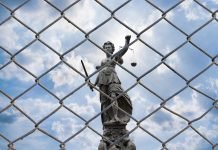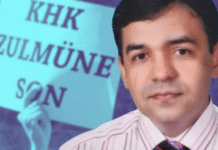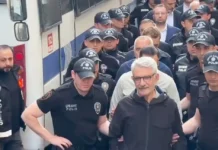The UN special rapporteur for freedom of expression David Kaye has expressed serious concerns at the deterioration of media freedom in Turkey and urged Turkish government to immediately release journalists, writers, judges and academic who are detained pursuant to counter-terrorism legislation and emergency decrees.
In a draft report on Turkey that was submitted to the UN Human Rights Council’s Thirty-fifth session, Kaye, who is the Special Rapporteur on the promotion and protection of the right to freedom of opinion and expression, said laws before and after the failed coup bid of July 15, 2016, “have established one of the worst environments for freedom of expression in Turkey in decades, if not one that is unprecedented in its modern history.”
“Cumulatively, the laws preceding the coup attempt and those that followed give authorities broad and increasingly unreviewable discretion to take measures against the press, writers, universities, jurists, civil servants, human rights defenders and many others”, the report said.
Kaye also stated that he visited Turkey from 14 to 18 November 2016 at the invitation of the Turkish government, but lamented that his visit was limited to five days by Ankara and his requests to meet jailed writers and journalists Asli Erdogan, Ahmet Altan, Mehmet Altan, Kadri Gursel, Murat Sabuncu, Turhan Gunay, cartoonist Musa Kart, and Judge Aydin Sefa Akay were denied by the government.
Kaye said he found laws and policies of censorship and criminalization are working to repress opinion and expression in all of the places that are fundamental to democratic life – the media, educational institutions, the judiciary and the bar, government bureaucracy, political space, and the vast online expanses of the digital age. “They do so notwithstanding limited evidence that the restrictions are necessary to protect legitimate interests such as national security and public order or the rights and reputations of others”, the report underlined.
Commenting on April 2017 constitutional amendement, the UN report noted that “increasing executive control and dominance erode the foundations necessary for the exercise of freedom of opinion and expression.” Kaye said his mission “illuminated a squeezing of civil society space that signals a radical backsliding from Turkey’s democratic path and deserves the most urgent attention to reverse.”
On law-decrees that the government use to bypass the Parliament under emergency rule that was renewed for the fourth time, the UN report made it clear that “the state of emergency decrees adopted in the aftermath of the coup attempt are far-reaching and give authorities wide discretionary powers to derogate from human rights obligations, without providing adequate channels for judicial review and appeal.”
“The emergency decrees apply to anyone “assessed to be” a member of a terrorist organisation, as well as to anyone acting in union or contact with such organizations. The decrees lack criteria for assessing membership or contact and leave overly broad discretion to authorities responsible for their execution, waiving ordinary administrative safeguards”, it said , adding to that “the decrees do not specify criteria on which such assessments are to be based, nor do they require individualised reasoning.”
It criticized that the persons who are purged from the government are not provided with evidence against them. “The decrees also facilitate impunity and lack of accountability by affording full legal, administrative, criminal and financial immunity to administrative authorities acting within the framework of the decrees”, the report underscored.
Kaye’s report pointed out that journalists and media workers were imprisoned in most cases based on vague charges and with either very little or no evidence presented or publicly available. He said prosecutors regularly accuse individuals of unprovable allegations that are impossible to defend. “For example, on 10 September 2016, Ahmet Altan and Mehmet Altan, two well-known intellectuals, were detained as part of the investigation launched following the attempted coup, accused of transmitting “subliminal messages” in support of the coup on a TV talk show”, the report recalled.
The report talked extensively on the crackdown on media outlets affiliated with the Gülen movement and journalists working or having previously worked for such outlets, journalists perceived to have connections to the Gülen movement, and independent, oppositional or minority media outlets and journalists accused of affiliation with the Gülen movement, despite little to no evidence to support these accusations. “Dozens of journalists working for such outlets have been imprisoned while many others have been left unemployed, despite distant if any evidence of connection to the movement, let alone activities unlawful under Turkish law and subject to limitation under human rights law”, the report explained.
It further elaborated that “The crackdown on media outlets also takes place through government takeover. On 5 March 2016, the large-circulation Zaman group was taken over by a government appointed administrative board over alleged links between the owner of its parent company and Gülen. This form of takeover immediately results in a change of the editorial policy of the journals and channels under the umbrella of the commandeered parent group”.
The report covered restrictions on the Internet in Turkey that included blocking web sites, investigating social media users, censorship requests for Twitter and Facebook content, and complete network shutdowns in parts of the country.
It also touched on criminalization of encryption by the Turkish government and most specifically the ByLock messaging service.
“The authorities have linked ByLock to the Gülen movement, claiming that it is a secret communication tool for Gulenists. The arrests take place sometimes merely on the basis of the existence of ByLock on a person’s computer, and the evidence presented is often ambiguous. Reportedly, the MIT obtained a list of global ByLock users that has been used to track and detain persons. Tens of thousands of civil servants reportedly have been dismissed or arrested for using the application”, the report explained.
The UN report criticized attacks on academic freedoms, saying that the government took aim at academics before the coup and intensified with mass purges after the coup. It said the space for political pluralism is shrinking, and opposition parties face terrorism-related accusations. On purges of close to 140,000 government employees, Kaye said he is “particularly concerned that the dismissals fail to identify specific criminal acts taken by targeted officials”. “In this context, it may be that the penalties target the opinions of individuals, as reflected in their alleged associations, in violation of Article 19(1) of the ICCPR”, he noted.
On civil society, the UN report said “pressures on civil society organizations limit the ability of individuals to enjoy the freedom of expression, whether individually or as a collective.” It criticized that recent legislative changes have rolled back previous achievements in the area of women’s rights. “In addition to being limited on the basis of overbroad and vague defamation and counter-terrorism grounds, funding restrictions and prior censorship represent two main barriers for artistic freedom of expression in Turkey”, the report stated.
Commenting on changes in the judiciary, the UN report said “the judiciary appears to be increasingly unavailable to those charged under the Anti-Terrorism and emergency laws. Nor does it appear available to the tens of thousands of individuals who have lost their employment according to vague accusations of association with the Gülenist movement and Kurdish organizations”. It said thousands of judges and prosecutors were dismissed and many of them were later arrested including one judge serving in the UN Mechanism for International Criminal Tribunals (MICT). Judge Aydin Sedaf Akay has been detained, even after the MICT ordered Turkish authorities to cease all legal proceedings against Judge Akay and to take all necessary measures to ensure his release from detention.
The UN Special Rapporteur issued following recommendations to Turkey:
On Media freedom and access to information
The Special Rapporteur is seriously concerned at the deterioration of media freedom in Turkey, which predates the coup attempt. The state of emergency cannot justify the adoption of disproportionate and arbitrary measures representing a severe blow to freedom of expression, media freedom and access to information in Turkey.
The Special Rapporteur urges the Government to immediately release journalists, writers, judges and academic who are detained pursuant to counter-terrorism legislation and emergency decrees. Nobody should be held in detention, investigated or prosecuted for expressing opinions that do not constitute an actual incitement to hatred or violence consistent with Article 20 and Article 19(3).
The Special Rapporteur urges the Government to adopt all appropriate measures to ensure that press and other media, and all individuals, are able to comment on public issues and to inform public opinion without censorship or constraint.
The Government must reverse its shutdowns of media outlets, including Internet media, networks and mobile telephony, and ensure that suspension of media outlets occur only in exceptional circumstances provided for by the law, and only in accordance with appropriate judicial procedures. Such measures should always be subject to judicial review.
Restrain the substantial restrictions on the internet
The Special Rapporteur calls on the Government to review the Internet Law and revise the broad authority to block and remove online content and to introduce less intrusive measures. The Special Rapporteur urges the Government to refrain from the excessive blocking and filtering of content and limit its requests for takedowns to actual cases of incitement meeting the requirements of Article 19(3) and Article 20 of the ICCPR.
Review of emergency decrees
The Government is obligated to ensure that any restriction on freedom of expression during the state of emergency is strictly proportionate to the exigency of the situation. The tests of necessity and proportionality are not suspended during a period of derogation linked with a state of emergency.
The Special Rapporteur urges the Government, with a view to ending the state of emergency, to reconsider whether the conditions at issue in July remain such as to justify its continuation. Regardless, he urges review and revision of the emergency decrees so as to ensure their consistency with international human rights norms and standards. In particular, persons deprived of their liberty pursuant to the emergency decrees must be entitled, in line with Article 9 of the ICCPR, to initiate proceedings before a court to challenge the lawfulness of their detention.
The Special Rapporteur urges the Government to ensure that anyone who has been victim of unlawful arrest, detention, or dismissal, or has any other legal claim, must have an enforceable right to review and remedy. Persons dismissed by virtue of emergency decree must be granted access to appropriate and independent judicial and administrative mechanisms to challenge the lawfulness of the decisions and to obtain adequate reparation.
Review of national legislation
National legislation on defamation and counter-terrorism ought to be brought in line with international standards. In particular, the Special Rapporteur urges the Government to review urgently the Anti-Terrorism Law so as to ensure that counter-terrorism measures are compatible with Article 19(3) of the ICCPR. Such offences as “encouragement of terrorism” and “extremist activity” as well as offences of “praising”, “glorifying”, or “justifying” terrorism, should be clearly defined to ensure that they do not continue to lead to unnecessary or disproportionate interference with freedom of expression.
The Special Rapporteur also calls on the Government to repeal articles 125(3) and 299 of the Penal Code, which criminalize the defamation of public officials and the President of the Republic. The mere fact that forms of expression are considered to be insulting to a public figure is not sufficient to justify the imposition of penalties. The criminalization of individuals solely for criticism of government can never be considered to be a necessary restriction on freedom of expression. Even in the absence of repeal, the Special Rapporteur urges senior public officials to refrain from the harassing use of such tools to silence criticism in the name of “insult” of public authority.
June 9, 2017















